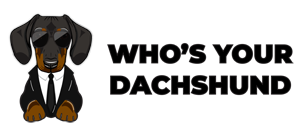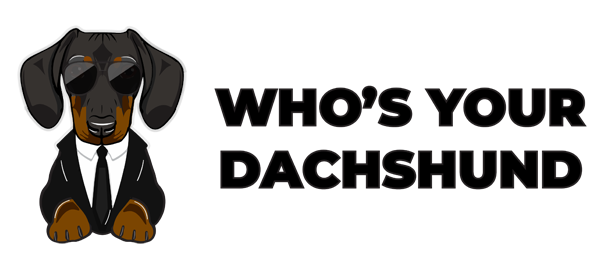
Dachshunds are prone to some health problems, some of which are genetic health issues, body type, and others caused by their environment or lifestyle. Among the genetic conditions that can affect dachshunds are congenital heart disease, hip dysplasia, and muscular dystrophy. Dachshunds can also be affected by diseases/health conditions common to all dogs, such as canine distemper and rabies. Certain dachshunds are prone to developing a compulsive disorder known as Zoomorphophobia (cattle shed syndrome), which makes them afraid of cattle in the shape of a shed.
14 of the Most Common Health Issues in Dachshunds
1. Intervertebral Disc Disease
Dachshunds are prone to herniated intervertebral discs. This debilitating condition occurs when the soft gel-like center in a disc pushes through a tear in its outer ring. Sadly, Dachshunds are subject to frequent injuries like this one, which can cause them to suffer severe pain and even paralysis if not discovered and treated immediately.
2. Charley Horses
Those familiar with Dachshunds know that they are prone to muscle spasms – otherwise known as Charley horses. These painful leg cramps occur most commonly in the hind legs and often strike without warning. Dachshunds that suffer from this affliction can benefit from sleeping with their legs elevated, consistently eating a high-quality diet, and maintaining a regular exercise schedule.
3. Dachshund Back Syndrome
Dachshund back syndrome is a severe condition that can cause paralysis in the hind legs. This condition’s cause is unknown, but it may be related to the Dachshund’s long spine and disproportionately large head.
4. Intervertebral Disk Disease (IVDD)
Although IVDD can occur in any breed, Dachshunds are especially prone to this degenerative spinal disease. Symptoms of IVDD include severe back pain, a complete inability to walk, and bowel or bladder incontinence.
5. Degenerative Myelopathy
Dachshunds are prone to degenerative myelopathy, which damages the spinal cord. Common symptoms of degenerative myelopathy include weakness in the hind legs and difficulty climbing stairs and jumping into cars. This disease is progressive, which means it will worsen over time, and there is no cure.
6. Patellar Luxation
Dachshunds are prone to patellar luxation, a condition in which the kneecap slips out of its normal position. This painful disorder can cause your dog to limp and have difficulty walking but is usually treatable with surgery.
7. Elbow Dysplasia
Many owners may not know that Dachshunds can suffer from elbow dysplasia, a painful condition caused by the elbow joint’s malformation. That may be due to their unique body structure.
8. Allergies and Ear Infections
According to the Dachshund Club of America, over 80% of all Dachshunds have at least one food allergy. The most common allergic triggers include beef, dairy products, chicken, lamb, and wheat.
9. Portosystemic Shunt
Portosystemic shunt is a condition that causes abnormal blood circulation and can lead to liver disease. It is reasonably common in Dachshunds, so it’s essential to have your dog tested for this disorder early – pre-symptomatic testing can occur as early as eight weeks of age.
10. Infectious Canine Hepatitis
Dachshunds are susceptible to infectious canine hepatitis, a dangerous condition that attacks the liver and other organs. There is a vaccine that can protect your Dachshund from this potentially fatal disease.
11. Bloat
Dachshunds dog breeds are most at risk for bloat, a painful condition when food and fluid accumulate in the stomach. Unfortunately, bloat is often fatal if not treated immediately with surgery to decompress the stomach. Symptoms include a swollen abdomen, excessive drooling, and lethargy.
12. Liver Shunt
Dachshunds also have a high risk of developing a liver shunt, another condition that can be life-threatening. Symptoms include an enlarged liver, pale gums, and episodes of depression and lethargy.
13. Basal Cell Tumor Syndrome
Although any dog can develop Basal Cell Tumor Syndrome (BCT), Dachshunds are especially prone to this debilitating disease. Unfortunately, there is no cure for BCT, so it’s vital to remove any suspicious masses whenever possible.
14. Canine Hip Dysplasia
Dachshunds are at risk of developing hip dysplasia, a painful condition caused by the hip joints’ malformation. Symptoms include difficulty rising after lying down and walking with an irregular gait.
Why are Dachshunds more susceptible to these health problems?
Dachshunds are prone to many different health problems, and all of them stem from a few other genetic defects. The first and most prominent is the hunchback or swayback. It is a consequence of a congenital disability in the spinal column, which turns some vertebrae into very soft sponges. Dachshunds with this defect have a tough time supporting their weight. That makes it hard for them to walk, run, jump or do anything else that requires a lot of leg power.
What Kind Of Health Issues Can Dachshunds Face?
A lot of people are asking, “What health problems are dachshunds prone to?” The answer is that they have a higher possibility for some diseases than other breeds, but these risks are manageable.
Dachshunds can suffer from spinal disc disease, obesity, back problems, and cancer. Weak knees in the long-legged variety are typical in large dogs bred to chase prey. The Orthopedic Foundation for Animals survey revealed that patellar luxation, or knee cap dislocation, was the most common orthopedic problem. That needs extra care when it occurs and treatment for knee pain.
Dachshund wheezing can indicate various respiratory problems such as kennel cough, upper respiratory infection, and congestive heart valve disease.
Dachshund Health Problems & Miniature Dachshund Health Issues
Dachshund health problems and dachshund health issues are quite prevalent in the breed. It is especially true in the more common types of dachshunds, such as miniature dachshunds, but even the larger dachshunds can have health problems and issues. Some of the most commonly seen health problems in the miniature dachshunds include:
In addition to these types of Dachshund health issues, dachshunds may experience other kinds of Dachshund health problems, as well. For example, the above list does not include hypothyroidism or the common occurrence of patellar luxation (kneecap dislocation).
Health Concerns In Dachshunds
Dachshunds are the oldest breeds of dogs still in existence. This dog is typically lively, intelligent, and hardy. However, they are prone to health concerns that need to be monitored by owners.
Like any other breed of dog, a Dachshund has health concerns that can be problems if you do not catch them in time. Some health issues affect this breed more than others. If you are an owner of a Dachshund or are considering getting one, it is crucial to know the health problems that affect these dogs.
Dachshund Common Health Problems
Dachshunds often suffer from several common health problems. One of the most common is back pain.
The Dachshund breed is known for its long, narrow, and low-slung body. The long spine is what causes these dogs to suffer from back pain. They are relatively small dogs, so their bodies’ weight is also not evenly distributed on their hind legs.
Dachshunds who are more comfortable and happy are the ones who have a strong and healthy back. Those with weak backs are just as unhappy as those with other health-related issues. That is because Dachshunds need to move around more than most other breeds due to their long backs.
Some risks associated with your Dachshund eating poop include intestinal parasites, resulting in anemia. Other complications that can arise are a variety of stomach and digestive problems.
Mini Dachshund Health Problems
The tiniest of all dachshunds are famous for their size, but they also have some health concerns that need to be addressed.
1. The smallest of the dachshunds are prone to spinal cord injuries.
2. Dachshunds with short legs are at a higher risk for arthritis than those with long legs.
3. Dachshunds have flat faces, making them more prone to breathing problems and snoring.
4. The flat faces may be a contributing factor to dental problems.
5. Most Dachshunds are heavy sleepers, which means that they can be easily injured if they run into or roll onto sharp objects during their slumber.
6. The smaller varieties of dachshunds are prone to heat exhaustion and dehydration in hot weather conditions because of their small size, shorter legs, and larger surface areas.
7. Dachshunds may suffer from separation anxiety.
8. Dachshunds can be prone to eye problems, skin infections, and ear infections.
9. The smallest of the dachshund varieties are susceptible to spinal cord injuries if they jump from a high surface such as a table or the sofa.
10. You should try and keep your Dachshund at controlled temperatures.
11. You should be careful when getting your Dachshund to use stairs to prevent them from falling and injuring themselves.
12. Dachshunds are very sensitive to cold weather, so you should make sure that they are comfortable in cold temperatures by keeping them indoors or using a coat for warmth, if necessary.
Some Dachshund Medical Problems
Dachshunds are not the most well-known breed of dog. You would be hard-pressed to find a person who knows what sort of medical problems Dachshunds have. So here is a little info about Dachshund’s health issues.
Patellar Luxation
Dachshunds are known to have a genetic problem called patellar luxation. You should know about this health disorder because the patella refers to the kneecap, and luxation means it’s out of place. In other words, this breeds’ kneecap is dislocated.
Dachshund Hip Dysplasia
Another problem they are known to have is hip dysplasia. The disorder results from its hip joints’ looseness, making it difficult for them to walk.
Dachshund Heart Problems
Dachshunds are also known to have heart problems, but these issues are not considered as severe as the two mentioned above. However, you should still note that Dachshunds can be born with a heart disease called dilated cardiomyopathy or DCM.
Intervertebral Disc Disease
Another disorder Dachshunds are susceptible to is intervertebral disc disease, which, if untreated, can cause paralysis and even death.
Acanthosis Nigricans Dachshunds
Also is known to have a skin disorder called acanthosis nigricans. It’s an excessive darkening of the skin, which usually starts at a dog’s elbows and armpits. The location is because it’s an insulin-like growth factor that causes it.
Dachshund Stomach Problems
People have a general complaint about Dachshunds because they suffer from stomach problems. That is because of their elongated bodies. Because of this, they are prone to problems caused by their internal organs being cramped.
Pancreatitis
The breed is also susceptible to a pancreas problem called pancreatitis, where the pancreas becomes inflamed.
Dachshund Skin Disorders
Dachshunds are also known to suffer from skin problems. The most common are allergies, eczema, atopic dermatitis, and seborrhea.
Hypothyroidism
Dachshunds are also known to have an endocrine disease called hypothyroidism. Aside from the fact that it causes the thyroid gland to fail in producing hormones, there are not many other details known about this disorder.
Dachshund Eye Problems
Dachshund is also known to have eye conditions. One problem is that they’re known for having progressive retinal atrophy, or PRA. This disorder causes the retina to lose its function in processing images and transmitting those images to the brain.
Dachshund Leg Problems
The breed is not only known for having issues with their eyes, but they’re also susceptible to problems with their legs. A common issue is a degenerative joint disease in the knees called osteochondritis dissecans.
Dachshund Ear Problems
Dachshunds are also known to have problems with their ears. One problem is that they’re known for having progressive retinal atrophy, or PRA. This disorder causes the retina to lose its function in processing images and transmitting those images to the brain.
Dachshund Tumors and Lumps
Another health issue this breed can have is tumors and lumps. They can get tumors under their skin or in their internal organs if they’re born with them.
Dachshund Teeth Problems
Dachshunds are also known to have problems with their teeth that cause bad breath.
Dachshund Digestive Issues
Not only do Dachshunds suffer from digestion problems, but they are prone to getting bloat or gastric dilatation/volvulus (GDV). This problem occurs when a dog’s stomach twists on itself. An untreated dog can die within several hours after eating food. If treated quickly enough, a dog may be ok; it depends on how severe the symptoms are.
Dachshund Illnesses: Dachshund Sick Symptoms
Your Dachshund may have several illnesses. The first step is to identify the symptoms of each disease. That will help you or your vet diagnose the problem correctly and find the appropriate treatment for your dog. Consult your vet if you notice any change in health, behavior, or appetite or any minor symptoms that have not resolved themselves.
The following information is a guideline only. Put your dog to the veterinarian if you suspect that he has a health problem. Different illnesses can cause symptoms, and the severity of these can vary from minor to life-threatening.
Why Is My Dachshund Limping
Most of us know that if our dog is limping, it’s because something has gone wrong with their leg. There are many different causes of limping in dogs, including orthopedic and soft tissue injuries. It’s imperative to differentiate between the two as each treatment is vastly different. It’s also important to know what type of pain your dog is experiencing as it can affect its ability to walk. For example, dogs in pain from a condition such as intervertebral disk disease will typically have a hard time walking.
Several different orthopedic conditions can affect the Dachshund. These include intervertebral disk disease, hip dysplasia, lumbosacral stenosis, and cruciate ligament rupture. To determine what is causing your dog’s lameness, your veterinarian will perform a physical examination and obtain a complete history of the problem.
Dachshunds with webbed feet can suffer from many health issues that affect your dog’s quality of life.
The most common cause:
- Injured or torn ligaments – These can be common in dogs, especially young ones. Dachshunds are particularly vulnerable to this, and you may notice your dog favoring one leg more than the other.
- Wounds – A wound on a dachshund’s foot can cause a lot of pain. The skin in their feet is fragile and tears very easily. If your dog is limping from a sore foot, you might see blood on the ground or see them licking their foot excessively.
- Damage to the spine, back, or pelvis – can also cause dachshunds to limp. You’ll notice a change in your dog’s gait, and it may begin to favor one leg over the other.
- Tissue injury– This can be a result of getting into an accident. You may notice your dog favoring one leg or that it will take a lot of effort for them to get up or move around.
- Any bone injuries – Dogs with broken bones can limp, and you may notice that their leg is deformed in some way or they have trouble putting weight on it.
- Infection or inflammation– This may be caused by a bite, infection from an abscessed tooth, or even a tick bite. You might notice swelling around the joint, redness in the skin, or a discharge from your dog’s leg.
- Tumors – Tumors can cause limping in dogs, and you’ll see them walk around with one leg off the ground. It is often caused by cancer that has spread to the body’s bones.
Issues On Dachshund Hip Pain
The Dachshund is a breed developed to hunt badgers, so it’s no surprise that they have hip pain issues. Because their bodies are long and their legs are short, their center of gravity is not in the center like most dogs. Thus, they can be prone to injuries in the pelvic region.
Hip Problems In Dachshunds – A dachshund pet is more likely to have hip problems than other dog breeds. That can cause pretty intense pain in some dogs, so it’s essential to look into if your dog has any hip pain.
Fading Pups – Dachshund’s pet is prone to spinal issues, leading to Fading Puppy Syndrome. A puppy suffering from this syndrome will lay around and not play as most puppies do. They will often be lethargic, which signifies that something is wrong.
Arthritis – Another common issue that plagues dachshunds is arthritis. Arthritis comes from an inflammation of the joints, which can happen for several reasons. One reason would be damage to the joint itself, such as damage caused by a disease or injury. Another reason is joint damage due to wear and tear, such as that caused by age.

